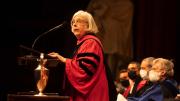In 2001, just before the Boston Red Sox franchise sold for $700 million, an investor group headed by Joe O'Donnell '67, M.B.A. '71, pulled out of the bidding when the previous ownership renewed the Fenway Park concession contract with Aramark a week before final bids were due. That firm competes with O'Donnell's Boston Concessions Group (BCG), which, as owners, had hoped to start selling hot dogs and beer at Fenway. Still, BCG feeds quite a few other fans, including those of the World Series champion Florida Marlins. O'Donnell founded and chairs BCG, a national food-service company whose 10,000 employees slake appetites at sporting and entertainment events, resorts, and conventions in 35 states. In the bleachers, they hawk peanuts; in the luxury skyboxes, they cater Beef Wellington. Says O'Donnell, laughing, "Everything from fine dining to swine dining."
To succeed, "You have to deal with a juxtaposition of extremeshigh quality, very fast," he says. Matching food to the crowd is crucial. For example, BCG serves more than 24 ski areas where, besides hot dogs and hamburgers, "You need yogurt and saladpeople are slightly more health-conscious." One client asked, "You'll be cooking to order, right?" O'Donnell smiles: "Try cooking for 7,500 people in two hours."
In sports, breaks in the action swell food and beverage revenue. With nine innings and a pause after every half-inning, a ballpark "is a concessionaire's dream18 time-outs," he says. In contrast, soccer has one break, at halftime, and soccer fans aren't big eaters. Boxing "is tremendous. Beer and hot dogs after every roundyou need to be fast." And score matters: a tight game that glues fans to their seats means less spent on food.
Turning to entertainment venues, O'Donnell says of feeding a symphony audience, "You might make two cents per personit's all black coffee. But with Rodney Dangerfield, $15 a person." Moviegoers also nosh with individuality. "At a porno film, the audience spends nothing, at a Disney film, more," he reports. "Action films are bestthey draw the big eaters."
After graduating from Phillips Exeter Academy, O'Donnell played varsity football and captained the baseball team at Harvard. He taught public school in his hometown of Everett, Massachusetts, and coached the Crimson baseball team before earning his M.B.A; he then remained at the Business School as associate dean of students from 1971 to 1976.
His career took a new tack when he met then-Boston Bruins president Paul Mooney, who had enrolled in the school's Program for Management Development and who also worked for Sportservice, a major food company. In 1977, O'Donnell went to work for Drive-In Concessions, a small division of Sportservice; he bought that division a year later and changed its name to Boston Concessions Group.
A Harvard Overseer, O'Donnell has served the University on various visiting committees and as a director of the Harvard Alumni Association. And his company sells food at Harvard football games, just as it does at many colleges around the nation. But Harvard Stadium Saturdays are a labor of love. During a football game at the University of Florida, whose field seats nearly 90,000, for example, concessions can rake in more than $1 million. In contrast, O'Donnell says, Harvard Stadium is "the worst concession opportunity of all time." The trouble, he explains, stems from an old Ivy League tradition: "Tailgating."
~Craig Lambert





